(Battime! – promoted by buhdydharma )
One of the things that always troubled me about the application of the term “Machiavellian” to the zany antics of the Bush misadministration is the extent to which Rovian Math – and even Cheneyian Cloak & Daggerism – ignores the master manipulator’s precepts. Indeed, like a conservative Christian who cherry-picks Leviticus, the architects of the failed philosophy of neoconservatism ignored some of the Prince’s very clear warnings about things like rulers relying on hired soldiers to look out for their interests – and look at the quagmire of black water it’s gotten us into.
Join me, if you will, in the Cave of the Moonbat, where tonight we’ll look into another occasion in which the use of mercenaries has bitten an empire in the ass. As usual, we Americans are by no means the first to experience the sort of happening-since-at-least-the-time-of-Rome setback that so shocks (shocks!) the neocons every time one of them so predictably comes to pass.
Historiorant: Last week’s historiorant addressed the completely-unrelated-to-Bush (wink, wink) question of When Kings Go Crazy; please consider it and this one the first volleys in a series of “When (nouns) Go Crazy” diaries for which history provides no shortage of subjects.
Machiavelli on Mercs
 In The Prince, Chapter XII, Nicolo Machiavelli makes it pretty clear the low regard with which a leader should regard mercenaries:
In The Prince, Chapter XII, Nicolo Machiavelli makes it pretty clear the low regard with which a leader should regard mercenaries:
I say, therefore, that the arms with which a prince defends his state are either his own, or they are mercenaries, auxiliaries, or mixed. Mercenaries and auxiliaries are useless and dangerous; and if one holds his state based on these arms, he will stand neither firm nor safe; for they are disunited, ambitious and without discipline, unfaithful, valiant before friends, cowardly before enemies; they have neither the fear of God nor fidelity to men, and destruction is deferred only so long as the attack is; for in peace one is robbed by them, and in war by the enemy. The fact is, they have no other attraction or reason for keeping the field than a trifle of stipend, which is not sufficient to make them willing to die for you.
emphasis mine – u.m.
That all seems unambiguous enough, but neocons don’t think like most of us: they have a narrowness of focus, an ability to discard context in favor of simplicity, that those on the left of the political spectrum simply lack. Out of the entire above paragraph, for example, Dana Perino would only see and quote the part that says “valiant before friends,” which she would then spin as a ringing Machiavellian endorsement of all things soldier-of-fortuneish. She would ignore entirely the rather stinging definition that Machiavelli provides, and if pressed, would wind up denying that the “contractors” “protecting” our “diplomatic” personnel in Iraq aren’t really mercenaries, anyway – most likely because they don’t fit some logic-torturing “interpretation” conjured up by a political hack in some legal department somewhere.
In fact, the United Nations does have rules and definitions surrounding mercenaries, and it certainly seems to this (admittedly not a lawyer) moonbat that Blackwater, et. al., do fit the description. Here’s A/RES/44/34, 72nd plenary meeting, 4 December 1989‘s opinion on the matter:
Article 1
1. A mercenary is any person who:
(a) Is specially recruited locally or abroad in order to fight in an armed conflict;
(b) Is motivated to take part in the hostilities essentially by the desire for private gain and, in fact, is promised, by or on behalf of a party to the conflict, material compensation substantially in excess of that promised or paid to combatants of similar rank and functions in the armed forces of that party;
(c) Is neither a national of a party to the conflict nor a resident of territory controlled by a party to the conflict;
(d) Is not a member of the armed forces of a party to the conflict; and
(e) Has not been sent by a State which is not a party to the conflict on official duty as a member of its armed forces.2. A mercenary is also any person who, in any other situation:
(a) Is specially recruited locally or abroad for the purpose of participating in a concerted act of violence aimed at: (i) Overthrowing a Government or otherwise undermining the constitutional order of a State; or (ii) Undermining the territorial integrity of a State;
(b) Is motivated to take part therein essentially by the desire for significant private gain and is prompted by the promise or payment of material compensation;
(c) Is neither a national nor a resident of the State against which such an act is directed; (d) Has not been sent by a State on official duty; and
(e) Is not a member of the armed forces of the State on whose territory the act is undertaken.Article 2
Any person who recruits, uses, finances or trains mercenaries, as defined in article 1 of the present Convention, commits an offence for the purposes of the Convention.
Neocons and their apologists have elected to go with the Chewbacca Defense on this one, stating that the fact that they’re called “Private Military Corporations” instead of “Armies for Sale” means that the modern incarnation of the mercenary is not, in fact, a mercenary, but something else (and something remarkably ill-defined) entirely. The irony here is that if it was not employing a mercenary for of its own – and if we’d actually ratified the 1977 Protocols – Bushco might’ve gotten away with defining al-Qaeda and other foreign fighters in Iraq as mercenaries, and thus avail itself of the anti-merc laws and you’re-screwed legal status to which the soldier-for-hire is otherwise relegated – best exemplified by the Protocol Additional to the Geneva Conventions of 12 August 1949:
Article 47.-Mercenaries
1. A mercenary shall not have the right to be a combatant or a prisoner of war.
Were the United States able to stand on even slightly higher moral ground in this regard, that line alone could have resulted in hundreds of one way tickets to Rush Limbaugh’s Club Gitmo™©®, but alas, here again conducting a war based upon the avariciousness of highly trained gunmen is shown to be a bad idea.
Mercenaries in Utopia
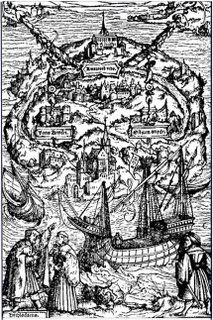 In researching this historiorant, I came across one source that clearly favored the use of mercenaries: Sir Thomas More describes Utopia as a nation whose defense is almost wholly reliant upon the services of hired swords. Fortunately for the Utopians (for whom things generally have a way of working out for the best), a tribe called the Zapolets lived about 500 miles away to the east, and they made for a conveniently expendable tip for the Utopian’s benevolent spear. Some excerpts:
In researching this historiorant, I came across one source that clearly favored the use of mercenaries: Sir Thomas More describes Utopia as a nation whose defense is almost wholly reliant upon the services of hired swords. Fortunately for the Utopians (for whom things generally have a way of working out for the best), a tribe called the Zapolets lived about 500 miles away to the east, and they made for a conveniently expendable tip for the Utopian’s benevolent spear. Some excerpts:
They are a rude, wild, and fierce nation, who delight in the woods and rocks, among which they were born and bred up. They are hardened both against heat, cold, and labor, and know nothing of the delicacies of life. They do not apply themselves to agriculture, nor do they care either for their houses or their clothes. Cattle is all that
they look after; and for the greatest part they live either by hunting, or upon rapine; and are made, as it were, only for war. They watch all opportunities of engaging in it, and very readily embrace such as are offered them…but will not engage to serve for any determined time, and agree upon such terms, that the next day they may go over to the enemies of those whom they serve, if they offer them a greater encouragement: and will perhaps return to them the day after that, upon a higher advance of their pay.(snip)
and such a regard have they for money, that they are easily wrought on by the difference of one penny a day to change sides. So entirely does their avarice influence them; and
yet this money, which they value so highly, is of little use to them; for what they purchase thus with their blood, they quickly waste on luxury, which among them is but of a poor and miserable form.This nation serves the Utopians against all people whatsoever, for they pay higher than any other. The Utopians hold this for a maxim, that as they seek out the best sort of men for their own use at home, so they make use of this worst sort of men for the consumption of war, and therefore they hire them with the offers of vast rewards, to expose themselves to all sorts of hazards, out of which the greater part never returns to claim their promises. …for the Utopians are not at all troubled how many of these happen to be killed, and reckon it a service done to mankind if they could be a means to deliver the world from such a lewd and vicious sort of people; that seem to have run together as to the
drain of human nature.
More’s Utopian mercs are, of course, entirely fictional, but as is the case with much of Bush’s buffet-style approach to developing a political philosophy, the similarities to contemporary policies are striking. There’s no way of telling if the Preznit has read Utopia or not – and he’d likely lie about it if asked – but since the Commander Guy has not threatened to bomb Utopia, we have to assume that he’s either never heard of the place, or he approves of its policies and has moved them lower on the list of Potential Conquestees (no country, of course, ever makes it entirely off that list).
Solving an Immigration Problem by Creating a Mercenary Problem
Say you’re running an empire, and you start to notice a bunch of poor, unwashed. foreign-speaking farmer-folk are amassing at your borders. They’re asking from refuge from some problem or another – and it might be a compelling enough case, except that you’ve heard the same kind of thing from every other tribe of smelly peasants that happens to border your rich, opulent lands. Some of those have even got so ballsy as to attack and pillage those lands, and so it occurs to you: why don’t I use one group of expendable foreigners to suppress the other group?
At first blush, it seems like a match made in heaven: you can offer the foreigners an accelerated path to citizenship (or land grants, or some other type of tangible reward) in exchange for serving as the catapult fodder that keeps your nation’s native-born sons from having to do their duty. Everybody who doesn’t die wins! – or at least, that’s how it appears on paper. In real life, the vagaries of human nature begin to assert themselves pretty quickly , and it won’t take long (in historical terms, not those of a Faux News “Breaking!!!” 24-hour story) before folks on both sides of the issue start abusing whatever system you set up. As often as not, it’ll be the people on the wealthier side of the river that start the exploitation, and as more and more abuses are heaped upon the powerless, the resentment builds to the point where the once-grateful immigrants are ready to literally rise up in revolt. When you’ve combined this dynamic with a public policy of arming and training a force of disposable mercenaries, the results can be Rumsfeldian in their city-destroying magnitude.
Emperor Valens (r. 364-378) should have known this, but if he did – well, he was the leader of the Eastern Roman Empire; the situation would be analogous to an American president (and scion of a military/political dynasty) being unable to empathize with a sin papales Mexican who’s ready to walk across 200 miles of desert to get a job picking fruit. So it was that as more and more Goths appeared on the northern banks of the Danube in the mid-4th century, Roman emperors responded with a mixture of impatience and indifference that turned a potential ally into a bitter foe inside of two generations.
Historiorant: When I Googled “Goths” in the course of researching this piece, many of the hits did not reference the ancient, sword-wielding type of Goths, but rather the bemetalled, pierced, and tattooed sort that one finds anyplace where there’s a critical mass of suburban angst. These modern Goths have apparently earned themselves a special place of enmity in the eyes of some with whom they share the planet: I honestly thought GOD HATES GOTHS.COM was a parody, until I started clicking the site’s links and found it was connected to the Satanic “ministry” of Fred Phelps. The Pharisee’s related sites also tell us that in addition to Goths and Gays, God also hates Retards (sic), Harry Potter (hint: J.K. Rowling is a witch!) and Sweden.
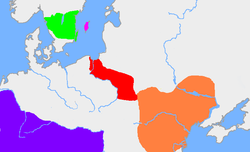 The Goths were a relatively peaceful, farming-type folk who lived in the area northwest of the Black Sea. They are thought to have migrated across the Baltic from Sweden (is the “Reverend” Phelps on to something after all?) between the 3rd and 1st centuries BCE, and by the time the Huns started their barbaric ride out of Central Asia, the Goths had influenced cultures from what would one day be Prussia to the mouths of the Danube. As the Hunnic invaders burned and looted across the future Southern Russia, the Goths picked up and fled before them, finally massing along the Danube and appealing to the Roman Empire, which controlled the territory south of the river, for protection and alleviation of the refugee crisis.
The Goths were a relatively peaceful, farming-type folk who lived in the area northwest of the Black Sea. They are thought to have migrated across the Baltic from Sweden (is the “Reverend” Phelps on to something after all?) between the 3rd and 1st centuries BCE, and by the time the Huns started their barbaric ride out of Central Asia, the Goths had influenced cultures from what would one day be Prussia to the mouths of the Danube. As the Hunnic invaders burned and looted across the future Southern Russia, the Goths picked up and fled before them, finally massing along the Danube and appealing to the Roman Empire, which controlled the territory south of the river, for protection and alleviation of the refugee crisis.
By the mid-4th century, Rome – both halves of it – had its own problems to deal with. In the East, the Sassanid Persians were pushing against the provinces around Mesopotamia once again, and some of those provinces were even revolting in their own right. Other decline-and-fall-type stuff was happening vis-à-vis the empire’s population, economy, and social order, so when the Gothic leader Fritigern asked Emperor Valens for a little land for his people, the Emperor gave only a conditional yes – at first, only a handful of higher-ranking Goths would be allowed to cross (think of it as an I-9-based immigration policy), immigrants would have to disarm, and eligible-aged men would be pressed into Roman military service. Terrified of the Huns at their rear, and realizing that the Romans were unable to enforce their declared borders, rank-and-file refugee Goths began crossing the Danube in large enough numbers that the less-than-honorable legions sent in to oversee the operation quickly lost control of things. According to 6th-century Byzantine historioranter Zosimus:
“The tribunes and other officers … went over to bring the Barbarians unarmed into the Roman territory; but occupied themselves solely in the gratification of their brutal appetites, or in procuring slaves, neglecting every thing that related to public affairs. A considerable number therefore crossed over with their arms, through this negligence. These, on arriving into the Roman dominion, forgot both their petition and their oaths. Thus all Thrace, Pannonia, and the whole country as far as Macedon and Thessaly were filled with Barbarians, who pillaged all in their way.”
Rome now reneged on any promises it had made to feed and assist the Goths, and those that didn’t turn to pillage were in some cases obligated to barter their children into slavery in exchange for an emaciated dog that they might provide a meal or two. I’m not kidding:
Soon famine and want came upon them, as often happens to a people not yet well settled in a country. Their princes and the leaders who ruled them in place of kings, that is Fritigern, Alatheus and Safrac, began to lament the plight of their army and begged Lupicinus and Maximus, the Roman commanders, to open a market. But to what will not the “cursed lust for gold” compel men to assent? The generals, swayed by avarice, sold them at a high price not only the flesh of sheep and oxen, but even the carcasses of dogs and unclean animals, so that a slave would be bartered for a loaf of bread or ten pounds of meat.
This had the wholly predictable result of pissing off the Goths even more. Ostensibly to calm matters down a bit, the Roman commander in Thrace, Lupicinus, invited Fritigern and another Goth leader to a banquet, where he subsequently attempted to assassinate them. Lupicinus was only half successful: an enraged Fritigern survived, and led his people on a looting spree severe enough to turn the Emperor’s attention from fighting Iranians in Armenia to an area uncomfortably close to his capitol.
Major Combat Operations Have Ended
On a hot August day in 378, Emperor Valens took up a position near the city of Adrianople (Hadrianapolis), a few miles west of Constantinople in what’s now the city of Erdine in European Turkey. A commander guy of the same caliber (actually, probably a little bit better) as George W. Bush, Valens eschewed the idea that should wait for a promised army being sent by the Western Emperor Gratian, and instead figured that his 20,000 cavalry and 40,000 foot could easily handle Fritigern’s 50,000 barbarian infantry. At first, it looked like Valens’ cockiness was justified: the discipline of the legions and the cavalry shocked and awed the savages, and it began to look like Adrianople was to be yet another Roman rout. Then the Gothic cavalry showed up.
In the early afternoon, 50,000 horsemen stormed onto the field, and Valens quickly found his forces surrounded. Ammianus Marcellinus brings us the blow-by-blow:
Presently our infantry also was left unsupported, while the different companies became so huddled together that a soldier could hardly draw his sword, or withdraw his hand after he had once stretched it out. And by this time such clouds of dust arose that it was scarcely possible to see the sky, which resounded with horrible cries; and in consequence, the darts, which were bearing death on every side, reached their mark, and fell with deadly effect, because no one could see them beforehand so as to guard against them.
But when the barbarians, rushing on with their enormous host, beat down our horses and men, and left no spot to which our ranks could fall back to deploy, while they were so closely packed that it was impossible to escape by forcing a way through them, our men at last began to despise death, and again took to their swords and slew all they encountered, while with mutual blows of battle-axes, helmets and breastplates were dashed in pieces.
(snip)
Amidst all this great tumult and confusion our infantry were exhausted by toil and danger, until at last they had neither strength left to fight, nor spirits to plan anything; their spears were broken by the frequent collisions, so that they were forced to content themselves with their drawn swords, which they thrust into the dense battalions of the enemy, disregarding their own safety, and seeing that every possibility of escape was cut off from them.
By the end of the day, 40,000 Romans lay dead in the worst defeat on Roman soil since the Battle of Cannae back in the Punic Wars, 600 years before. Reports conflict on what happened to Valens himself – some say he died when a shack in which his wounds were being tended was set alight, other say he fell on the field of battle, from which his corpse was removed by the victors. Regardless, his body was never located.
The next Emperor, Theodosius I (r. 379-395), kept the Goths from truly capitalizing on their shocking victory while reorganizing the army of Eastern Rome, and though he seems to have inflicted a decisive defeat upon the Goths in Thrace in 379, Rome was nevertheless forced to agree to some heretofore way-overboard requests from their recent immigrants.
The exact terms of this settlement have not been preserved, but it is clear that the Goths were granted the right to settle large amounts of land along the Danube frontier in the diocese of Thrace and enjoyed an unusual degree of autonomy. Many came to serve in the Roman army, but the terms of their service remain unclear. Many volunteered to serve on a full-time professional basis, while more were obliged to serve only for the duration of a specific campaign. The results were that the Goths who settled within the empire remained a constant threat to its internal stability.
Actually, the status of at least one of those Visigothic (“Western Goth,” as opposed to the Ostrogoths, who remained in the east and fell, for a time, under the domination of the Huns before invading Roman lands themselves) warriors is known. Alaric had politicked and fought on Rome’s behalf for a couple of decades, and by the turn of the century, he held the highest rank in the Roman military that a barbarian could: magister militarum. He also had a list of grievances against the vacillating, weak-willed Emperor Honorius (r. 395-423) about a mile long, and when Rome was abandoned as the capitol in favor of the less-accessible, more-defensible swamp-city of Ravenna in 402, Alaric began to step up the pressure.
 Honorius’ advisor Stilicho wanted to use Alaric’s Visigoths to campaign against the Eastern Emperor, but the plan fell apart and an army of well-led, angry, and unpaid Goths was stuck in Italy. Listening to bad advice, Honorius decided to execute Stilicho and stiff the warriors (who, after all, wound up not being needed). Alaric, determined to see his army paid once and for, moved out of the Alps and down toward Rome itself. In 408, he began a drawn-out siege of the city, during which he negotiated with the passive/aggressive emperor to no avail, even as his own army starved in the suburbs of the metropolis they surrounded. Still, for two years a residual loyalty to the imperial purple and a real desire to be perceived as being “as good as a Roman” stayed Alaric’s hand:
Honorius’ advisor Stilicho wanted to use Alaric’s Visigoths to campaign against the Eastern Emperor, but the plan fell apart and an army of well-led, angry, and unpaid Goths was stuck in Italy. Listening to bad advice, Honorius decided to execute Stilicho and stiff the warriors (who, after all, wound up not being needed). Alaric, determined to see his army paid once and for, moved out of the Alps and down toward Rome itself. In 408, he began a drawn-out siege of the city, during which he negotiated with the passive/aggressive emperor to no avail, even as his own army starved in the suburbs of the metropolis they surrounded. Still, for two years a residual loyalty to the imperial purple and a real desire to be perceived as being “as good as a Roman” stayed Alaric’s hand:
He had it in his power to deliver the killing blow, to seize the city of Rome itself: the eternal city, no longer an imperial residence, no longer the capital of the world, but still the symbolic heart of empire. Enemies had long believed him capable of such an enormity. The greatest Latin poet of the century, an Egyptian named Claudian, accused Alaric of having a malign destiny to pierce the walls of the immortal Urbs, ‘the city’, as Rome was called. Three times he had threatened, three times he had held back. To make good on his threat, after all, would be the end of all his ambitions, all his hopes: an irrevocable move that would make any future negotiation impossible and place Alaric beyond the bounds of civilized politics forever. He did not want that, had never wanted that, and for two long years he had hesitated.
For their part, the Romans acted the way they typically did in response to crisis: they looked for a scapegoat.
many a Roman vendetta was settled while the Gothic army camped before the walls and people looked for a neighbour whom they could blame. Serena, niece of Theodosius, widow of Stilicho, and thus cousin and mother-in-law of the reigning emperor, was strangled on suspicion of collusion with Alaric, with the open approval of the emperor’s sister Galla Placidia. She was not the only victim, and famine and disease soon made matters worse: ‘Corpses lay everywhere’, we are told, ‘and since the bodies could not be buried outside the city with the enemy guarding every exit, the city became their tomb. Even if there had been no shortage of food, the stench from the corpses would have been enough to destroy the bodies of the living’.
Finally, on the night of August 23rd, 410, Alaric had had enough, and the next day ordered his disgruntled mercenaries to sack the city. For three days the former capital of the world lay prostrate before the rampaging barbarians, and they pillaged to an extent that would have made a Baghdad Museum thief green with envy:
The great houses of the city were looted and the treasures seized were on a scale that remains staggering: five years later, when Alaric’s successor Athaulf married his new bride, he gave her ‘fifty handsome young men dressed in silk, each bearing aloft two very large dishes, one full of gold, the other full of precious – nay, priceless – gems, which the Goths had seized in the sack of Rome’. Supposedly out of reverence for Saint Peter, Alaric left untouched the church on the Vatican that housed his tomb, and in general the Goths made an effort not to violate the churches. But however much some might take comfort in that slight forebearance, the verdict of the world was shock and horror: ‘The mother of the world has been murdered’.
The Wagnerian View
A Possibly More Realistic Interpretation
Western Rome survived (after a fashion) for several more decades following the sack of the Goths, but the impact of seeing the City of Caesars brought low by hired thugs was the first of many last throes of empire. Thereafter, more and more deals had to be cut with more and more barbarian tribes as they threatened to repeat Alaric’s rampage, and by the turn of the next century, the population had been reduced from perhaps a million (in its long-ago heyday) to a few tens of thousands of shell-shocked descendents of survivors living amidst the burned out ruins. Aspire as they might to replace the great empire, no barbarian leader ever pulled off the feat, and Europe descended into what some call a Dark Age that was to last half a millennium.
Historiorant:

So, was it worth it for Rome to turn refugees into mercenaries as an expedient method of killing two birds with one stone?
Both the long and the short answer is: No, it was not. It’s never a good idea for a leader to place his nation’s safety in the hands of men who kill people solely for personal profit. The Goths and what they did to Rome (as well as what Rome did to them) are by no means an isolated example of this particular historical constant – a fact that will be explored in upcoming historiorants – but the story ought to at least be cautionary enough to put to rest any of that silly neocon talk of solving our southern border dilemma by fast-tracking citizenship through military service. After all, if Machiavelli himself cautions against using them, soldiers-for-hire must be a really poor idea…
Historically hip entrances to the Cave of the Moonbat can be found at Daily Kos, Never In Our Names, Bits of News, and DocuDharma.

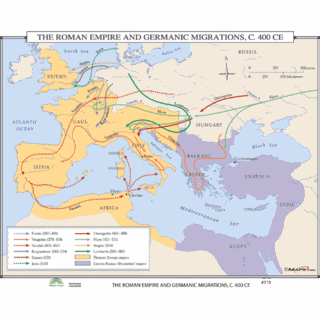

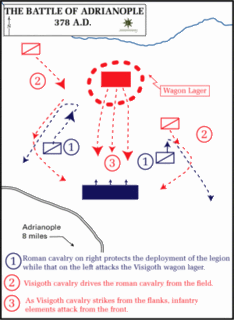
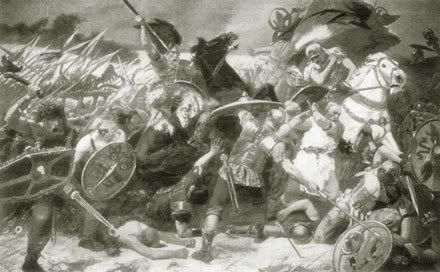
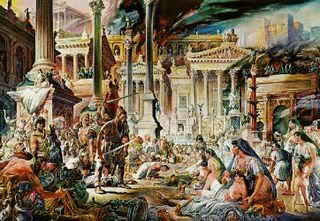
11 comments
Skip to comment form
Author
Looks like there’s a big event up tonight, so I thought it might be better to post over here on the right side.
And on an only-somewhat related matter: Go Red Sox!
A kinder, gentler Blackwater has changed its logo. The size of the bear paw has been reduced, and the red crosshairs removed. But we are not fooled.
Thank you for another wondrous tour a wing of your elegant cave, Brother Moonbat.
are soooo smart! 😉
Blog owners are next aren’t they??? “When Blogwners Go Crazy,” right??? Why do you hate blog owners, what have we ever done to you? You cooked this whole series as a way to go after me didn’t you? Ah! But I can prove with perfect geometric logic that my traitorous officers stole the strawberries, there was definitely a key!….so why do you think Blogwners are crazy, huh, huh, huh, huh, huh???? Whyyyyyyyyy?????
how our newly elected Dems can side with or oldly “selected” Neo-con rethugs and pass something like HR 1955.
And while I do endorse “Go Sox” I do so reluctantly with the thought that Boston at this specific moment in history lends itself to, in marketing value, a candidate for a false flag operation. Yes, that is the depth of my distrust of our current “government”.